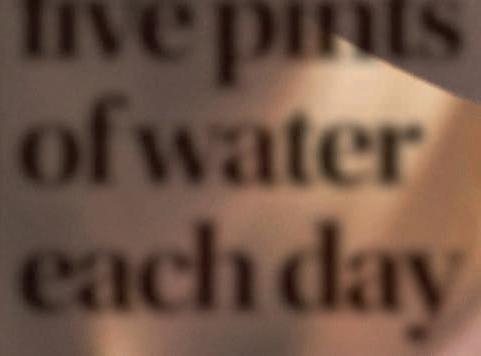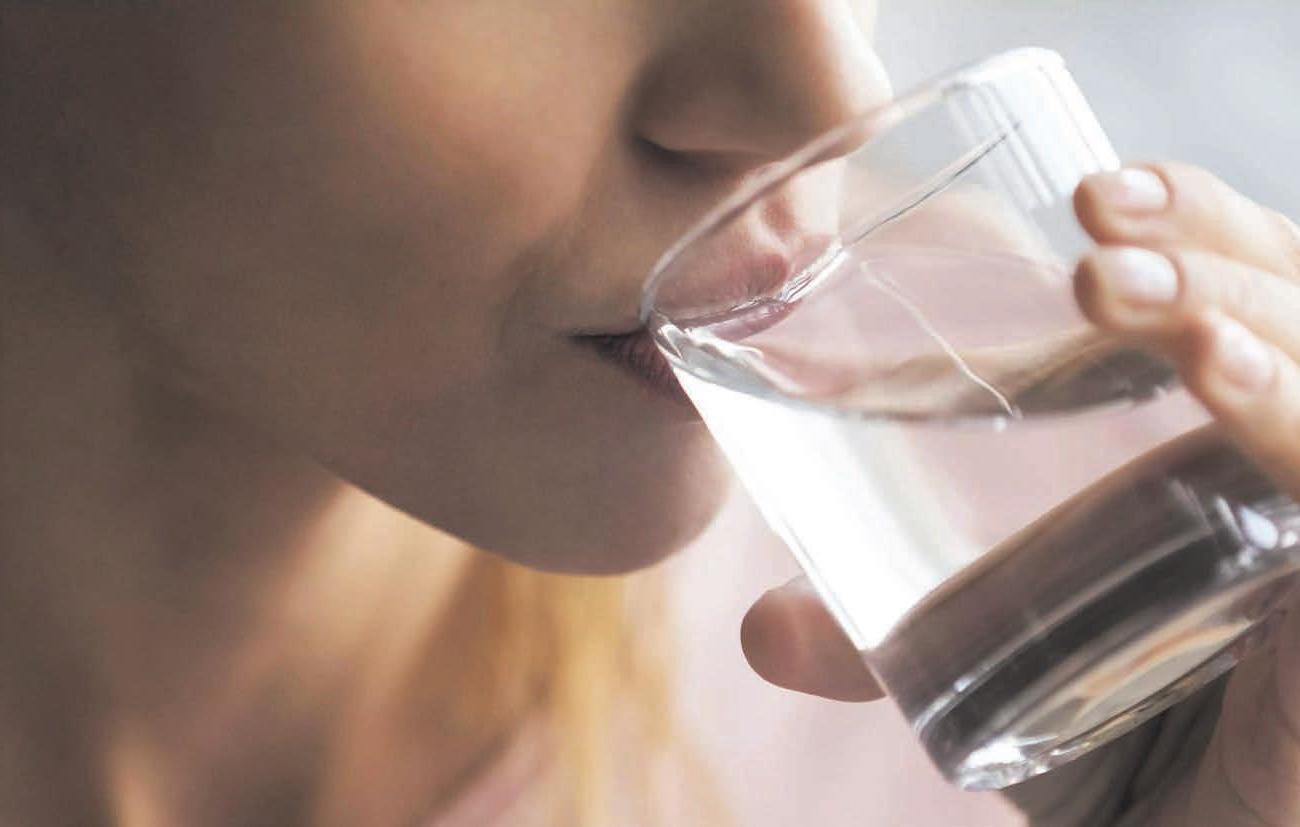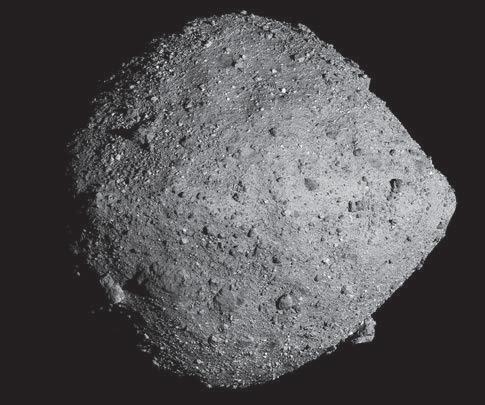
6 minute read
Health & Science

Why you need, but only, five pints of water each day
Advertisement

IT has long been known that hydration is essential to a properly functioning body. Our bodies are 50 to 70 percent water, which means an average man will contain up to 40 litres (10.6 gallons). is can di er on any given day, and it largely explains why our body weight also can uctuate by about ve pounds a day, according ti a report on Big ink.com
It is recommended that we each drink roughly thee litres (say, ve pints) of water a day to replace the stu we lose through breathing, sweating, and urinating. While this seems like a lot, for most of us, that water comes from drinks like co ee or soda, and up to 20% of it can come from the food we eat. Yet, on some days, we just do not drink enough, and it shows.
When we are mildly dehydrated, our bodies start to creak. We get headaches because, without water, the brain will contract ever so slightly, causing it to pull away from the skull. We get constipated because our body draws needed water from the large intestine. We get tired and nd it hard to focus because, without water, our blood literally thickens, meaning the body has to work harder to get nutrients and oxygen to the organs.
It is thought that even a 2% drop in hydration levels can noticeably impede performance in a variety of areas. Usually, this can be easily resolved, but what happens if you continue to dehydrate? And why is it thought to be one of the most painful and protracted deaths that we can experience?
When the body is forced into extreme situations like heat, cold, or water deprivation, it makes a tactical decision to withdraw resources from the least essential parts rst. With dehydration, this initially happens in the kidneys. Our kidneys will reabsorb water that would have been used in urine, so this is why your urine gets darker when you are dehydrated — the urea concentration increases.
When this is still not enough, the body will draw water from your cells and organs to retain the necessary blood pressure to keep you ticking. Your eyes will contract to expose the conjunctiva, your lips will shrivel away entirely, your teeth and gums will project outward like on a skeleton, your skin blackens and dries out, and your tongue becomes a tiny piece of beef jerky. If you are cut, you are too dry to even bleed.
Only after days of this slow torture will you die. With less and less water, the blood in your body will thicken, and your blood pressure will drop drastically. is means that all of the oxygen and nutrients in your blood will take a lot longer to get to your organs, and so they become deprived. Your brain, heart, kidneys, and liver begin to fail. Ultimately, your brain will start to shrink from osmosis in an attempt to hydrate the body (the brain has a lot of water), which eventually will cause you to die.
When blood volume changes — that is, decreases through dehydration or increases through overhydration — the careful balance of electrolytes is disrupted. ese electrolytes (potassium and sodium, mainly) are responsible for muscle contraction and conducting nerve signals, so an imbalance is extremely serious and potentially lethal. is is why rehydration needs to be treated as carefully as dehydration. In 2007, tness instructor David Rogers died after nishing the London Marathon, not because he drank too little but because he drank far too much. His was far from the only such death. Today, it is thought that more athletes die from overhydration than dehydration. e problem is that when we feel really thirsty, it can take a while for the body (speci cally, the hypothalamus in the brain) to register that it has enough water. If someone drinks ve litres of water drinks in a short space of time, the body will whisk the uid away to cells far too quickly. is causes sodium levels to become diluted (a state known as hyponatremia), which in turn causes organs like the lungs and brain to take on too much water and swell dangerously. is could cause you to faint or even die.
Hyponatremia highlights just how fragile our body’s homeostatic balance really is. While the human body can endure a great many things — and it really is hugely adaptable most of the time — it is also in many ways incredibly fragile. Even a day without a glass of water can impede our performance. After a few more days, you will be dead.
So, the next time you notice your urine darkening, remember that this is the rst step your body is taking to prevent serious organ damage.
This asteroid is one of the most likely to hit Earth but don’t lose sleep over it
NEW exact measurements show that the asteroid Bennu has a higher chance than originally thought of impacting our planet sometime in the next 300 years, according to American space agency NASA.
For hundreds of millions of years, a top-shaped rubble pile called Bennu has orbited the sun in relative isolation, writes Michael Greshko in National Geographic. e asteroid, about a third of a mile wide at its equator, poses no immediate threat to our planet. But hundreds of years from now, there is a small chance that Bennu could slam into Earth, reports Greshko.
In a new study published in the scienti c journal Icarus, scientists used data from NASA’s OSIRIS-REx spacecraft to make a precise calculation of Bennu’s orbit and its future proximity to our home planet. e researchers then analysed the impact hazard between now and the year 2300. e study nds a one-in-1,750 chance of a future collision over the next three centuries — a slightly higher probability than previously estimated.
Nearly all of the riskiest encounters with Benny will occur in the late 2100s and early 2200s, with the single likeliest impact coming on the afternoon of September 24, 2182. On that Tuesday, Bennu has about a onein-2,700 chance of hitting Earth. e team — led by Davide Farnocchia, a navigation engineer at NASA’s Jet Propulsion Laboratory —reached its revised estimate by pinpointing Bennu’s distance from Earth to within about seven feet at dozens of times between 2019 and 2020. at level of precision is like measuring the distance between the Empire State Building and the Ei el Tower to within a few thousandths of an inch.
“Bennu is by far the best characterised asteroid in the solar system,” says University of Arizona planetary scientist Dante Lauretta, OSIRIS-Ex’s principal investigator and the study’s senior author. “We know where it’s going to be over 100 years into the future, within meters. No other object in the solar system has that level of delity to its orbital solution—even Earth!”
University of Arizona planetary scientist Amy Mainzer, an expert on near-Earth asteroids who wasn’t involved with the study, lauded the team’s “absolutely white-glove” calculations. “If you want to be able to predict where [an asteroid] is going to go in the future, that prediction is entirely determined by how well you can measure where it is today,” she says. “ is team has made an extremely precise measurement.”
Despite the slightly higher chance of impact, the risks from Bennu shouldn’t keep anyone awake at night. ere’s more than a 99.9 percent chance that Bennu will not hit Earth in the next three centuries, and an impact from Bennu wouldn’t cause a mass extinction like the dino-killing Chicxulub impact 66 million years ago. at asteroid was probably about six miles across; Bennu is less than a third of a mile wide, on average.
Even so, a collision with Bennu would be regionally devastating. An impact would pack the energy of more than 1.1 billion tons of TNT, roughly two million times the energy of last year’s devastating port explosion in Beirut, Lebanon.









